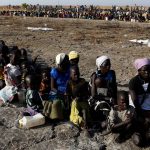South Sudan has secured $106 million from the World Bank and the African Development Bank, in part to pay for food imports as millions face starvation and to fund the construction of a road to trade partner Kenya, its finance minister said.
Parts of the war-ravaged country are suffering famine. A three-year civil war has forced millions from their homes, sent the oil-producing economy into a tail-spin and devastated crop harvests, just as the worst drought in years bites.
Finance Minister Stephen Dhieu Dau told Reuters late on Monday that the government had signed a deal with the World Bank for a $50 million grant “to meet the food gaps in South Sudan”.
Speaking by telephone from Washington where he had been attending meetings with lenders, the minister said those funds would be disbursed soon and finance food imports from Tanzania and Uganda.
Dau said a further $8 million agreed with the World Bank was earmarked for the construction of a road connecting the capital Juba to Kenya.
Separately, the African Development Bank will provide loans and grants worth $48 million to help strengthen the recession-hit economy, the minister said, without giving details.
South Sudan, the world’s youngest country, descended into civil war in 2013 after President Salva Kiir fired his deputy, unleashing a conflict that has spawned a patchwork of armed factions.
The fighting has hit oil production and food cultivation amid soaring inflation. The IMF says the economy shrunk by almost 20 percent in the two years through to 2015/16, and forecasts a 3.5 percent contraction this year.
South Sudan has secured $106 million from the World Bank and the African Development Bank, in part to pay for food imports as millions face starvation and to fund the construction of a road to trade partner Kenya, its finance minister said.
Parts of the war-ravaged country are suffering famine. A three-year civil war has forced millions from their homes, sent the oil-producing economy into a tail-spin and devastated crop harvests, just as the worst drought in years bites.
Finance Minister Stephen Dhieu Dau told Reuters late on Monday that the government had signed a deal with the World Bank for a $50 million grant “to meet the food gaps in South Sudan”.
Speaking by telephone from Washington where he had been attending meetings with lenders, the minister said those funds would be disbursed soon and finance food imports from Tanzania and Uganda.
Dau said a further $8 million agreed with the World Bank was earmarked for the construction of a road connecting the capital Juba to Kenya.
Separately, the African Development Bank will provide loans and grants worth $48 million to help strengthen the recession-hit economy, the minister said, without giving details.
South Sudan, the world’s youngest country, descended into civil war in 2013 after President Salva Kiir fired his deputy, unleashing a conflict that has spawned a patchwork of armed factions.
The fighting has hit oil production and food cultivation amid soaring inflation. The IMF says the economy shrunk by almost 20 percent in the two years through to 2015/16, and forecasts a 3.5 percent contraction this year.
South Sudan has secured $106 million from the World Bank and the African Development Bank, in part to pay for food imports as millions face starvation and to fund the construction of a road to trade partner Kenya, its finance minister said.
Parts of the war-ravaged country are suffering famine. A three-year civil war has forced millions from their homes, sent the oil-producing economy into a tail-spin and devastated crop harvests, just as the worst drought in years bites.
Finance Minister Stephen Dhieu Dau told Reuters late on Monday that the government had signed a deal with the World Bank for a $50 million grant “to meet the food gaps in South Sudan”.
Speaking by telephone from Washington where he had been attending meetings with lenders, the minister said those funds would be disbursed soon and finance food imports from Tanzania and Uganda.
Dau said a further $8 million agreed with the World Bank was earmarked for the construction of a road connecting the capital Juba to Kenya.
Separately, the African Development Bank will provide loans and grants worth $48 million to help strengthen the recession-hit economy, the minister said, without giving details.
South Sudan, the world’s youngest country, descended into civil war in 2013 after President Salva Kiir fired his deputy, unleashing a conflict that has spawned a patchwork of armed factions.
The fighting has hit oil production and food cultivation amid soaring inflation. The IMF says the economy shrunk by almost 20 percent in the two years through to 2015/16, and forecasts a 3.5 percent contraction this year.
South Sudan has secured $106 million from the World Bank and the African Development Bank, in part to pay for food imports as millions face starvation and to fund the construction of a road to trade partner Kenya, its finance minister said.
Parts of the war-ravaged country are suffering famine. A three-year civil war has forced millions from their homes, sent the oil-producing economy into a tail-spin and devastated crop harvests, just as the worst drought in years bites.
Finance Minister Stephen Dhieu Dau told Reuters late on Monday that the government had signed a deal with the World Bank for a $50 million grant “to meet the food gaps in South Sudan”.
Speaking by telephone from Washington where he had been attending meetings with lenders, the minister said those funds would be disbursed soon and finance food imports from Tanzania and Uganda.
Dau said a further $8 million agreed with the World Bank was earmarked for the construction of a road connecting the capital Juba to Kenya.
Separately, the African Development Bank will provide loans and grants worth $48 million to help strengthen the recession-hit economy, the minister said, without giving details.
South Sudan, the world’s youngest country, descended into civil war in 2013 after President Salva Kiir fired his deputy, unleashing a conflict that has spawned a patchwork of armed factions.
The fighting has hit oil production and food cultivation amid soaring inflation. The IMF says the economy shrunk by almost 20 percent in the two years through to 2015/16, and forecasts a 3.5 percent contraction this year.
South Sudan has secured $106 million from the World Bank and the African Development Bank, in part to pay for food imports as millions face starvation and to fund the construction of a road to trade partner Kenya, its finance minister said.
Parts of the war-ravaged country are suffering famine. A three-year civil war has forced millions from their homes, sent the oil-producing economy into a tail-spin and devastated crop harvests, just as the worst drought in years bites.
Finance Minister Stephen Dhieu Dau told Reuters late on Monday that the government had signed a deal with the World Bank for a $50 million grant “to meet the food gaps in South Sudan”.
Speaking by telephone from Washington where he had been attending meetings with lenders, the minister said those funds would be disbursed soon and finance food imports from Tanzania and Uganda.
Dau said a further $8 million agreed with the World Bank was earmarked for the construction of a road connecting the capital Juba to Kenya.
Separately, the African Development Bank will provide loans and grants worth $48 million to help strengthen the recession-hit economy, the minister said, without giving details.
South Sudan, the world’s youngest country, descended into civil war in 2013 after President Salva Kiir fired his deputy, unleashing a conflict that has spawned a patchwork of armed factions.
The fighting has hit oil production and food cultivation amid soaring inflation. The IMF says the economy shrunk by almost 20 percent in the two years through to 2015/16, and forecasts a 3.5 percent contraction this year.
South Sudan has secured $106 million from the World Bank and the African Development Bank, in part to pay for food imports as millions face starvation and to fund the construction of a road to trade partner Kenya, its finance minister said.
Parts of the war-ravaged country are suffering famine. A three-year civil war has forced millions from their homes, sent the oil-producing economy into a tail-spin and devastated crop harvests, just as the worst drought in years bites.
Finance Minister Stephen Dhieu Dau told Reuters late on Monday that the government had signed a deal with the World Bank for a $50 million grant “to meet the food gaps in South Sudan”.
Speaking by telephone from Washington where he had been attending meetings with lenders, the minister said those funds would be disbursed soon and finance food imports from Tanzania and Uganda.
Dau said a further $8 million agreed with the World Bank was earmarked for the construction of a road connecting the capital Juba to Kenya.
Separately, the African Development Bank will provide loans and grants worth $48 million to help strengthen the recession-hit economy, the minister said, without giving details.
South Sudan, the world’s youngest country, descended into civil war in 2013 after President Salva Kiir fired his deputy, unleashing a conflict that has spawned a patchwork of armed factions.
The fighting has hit oil production and food cultivation amid soaring inflation. The IMF says the economy shrunk by almost 20 percent in the two years through to 2015/16, and forecasts a 3.5 percent contraction this year.
South Sudan has secured $106 million from the World Bank and the African Development Bank, in part to pay for food imports as millions face starvation and to fund the construction of a road to trade partner Kenya, its finance minister said.
Parts of the war-ravaged country are suffering famine. A three-year civil war has forced millions from their homes, sent the oil-producing economy into a tail-spin and devastated crop harvests, just as the worst drought in years bites.
Finance Minister Stephen Dhieu Dau told Reuters late on Monday that the government had signed a deal with the World Bank for a $50 million grant “to meet the food gaps in South Sudan”.
Speaking by telephone from Washington where he had been attending meetings with lenders, the minister said those funds would be disbursed soon and finance food imports from Tanzania and Uganda.
Dau said a further $8 million agreed with the World Bank was earmarked for the construction of a road connecting the capital Juba to Kenya.
Separately, the African Development Bank will provide loans and grants worth $48 million to help strengthen the recession-hit economy, the minister said, without giving details.
South Sudan, the world’s youngest country, descended into civil war in 2013 after President Salva Kiir fired his deputy, unleashing a conflict that has spawned a patchwork of armed factions.
The fighting has hit oil production and food cultivation amid soaring inflation. The IMF says the economy shrunk by almost 20 percent in the two years through to 2015/16, and forecasts a 3.5 percent contraction this year.
South Sudan has secured $106 million from the World Bank and the African Development Bank, in part to pay for food imports as millions face starvation and to fund the construction of a road to trade partner Kenya, its finance minister said.
Parts of the war-ravaged country are suffering famine. A three-year civil war has forced millions from their homes, sent the oil-producing economy into a tail-spin and devastated crop harvests, just as the worst drought in years bites.
Finance Minister Stephen Dhieu Dau told Reuters late on Monday that the government had signed a deal with the World Bank for a $50 million grant “to meet the food gaps in South Sudan”.
Speaking by telephone from Washington where he had been attending meetings with lenders, the minister said those funds would be disbursed soon and finance food imports from Tanzania and Uganda.
Dau said a further $8 million agreed with the World Bank was earmarked for the construction of a road connecting the capital Juba to Kenya.
Separately, the African Development Bank will provide loans and grants worth $48 million to help strengthen the recession-hit economy, the minister said, without giving details.
South Sudan, the world’s youngest country, descended into civil war in 2013 after President Salva Kiir fired his deputy, unleashing a conflict that has spawned a patchwork of armed factions.
The fighting has hit oil production and food cultivation amid soaring inflation. The IMF says the economy shrunk by almost 20 percent in the two years through to 2015/16, and forecasts a 3.5 percent contraction this year.











